Arts & Culture
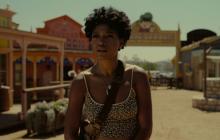
Nope, writer/director Jordan Peele’s third theatrical release, opens with a Bible verse: “I will pelt you with filth, I will treat you with contempt and make you a spectacle” (Nahum 3:6). Cut to a blood-soaked sitcom set where a chimpanzee — arms and mouth also covered in blood — wanders around before settling down and looking at the audience.

Core to Christianity is this notion of hospitality and trying hard to hear your neighbor, hear what they’re trying to say, and even giving voice to what they’re trying to say. And you may not always agree with the melody. But part of what we see Jesus do is pay attention to the fact that every person in front of him has a melody that God’s given them.

What makes a god worthy of worship? A heavy question, and probably not one you’d expect from the Marvel Cinematic Universe. But writer, director Taika Waititi’s latest film, Thor: Love and Thunder, takes aim at that very question.

Scripture is quoted twice in the latest season of Stranger Things, a first for the Netflix original that introduced us to the military experiments happening in the small Midwestern town of Hawkins, Eggo-loving Eleven, and the magic of Steve Harrington’s hair.

I was in elementary school when the first Harry Potter books were published in the United States. At the time, I was a painfully shy and awkward child; I treasured my library card and found solace in the stacks of books I carried home from our local branch. Though I was a prime target for a sensational new children’s book series, my parents — like the rest of our fundamentalist Baptist church — deemed anything about witchcraft inappropriate reading for good Christian children.

Above all else, Luhrmann displays Elvis as a man-turned-god who was exhausted trying to make peace with his paradoxes.

IN HER RECENT article “Praying the Imprecatory Psalms Is an Act of Nonviolence,” Liz Cooledge Jenkins explains that the imprecatory psalms of the Hebrew Bible “demand that God exact judgment against evildoers.” These psalms are particularly ... colorful. Take Psalm 35, for example:
Let ruin come on them unawares.
And let the net that they hid ensnare them;
let them fall in it—to their ruin.
In comparison to other imprecatory psalms, the above is fairly sanitized. Often in these verses, the psalmist calls for teeth-breaking, infant murder, and widow-making. To be honest, I’ve struggled to read them. My privileged life has left me with few enemies worth cursing and scant violence to avenge. But I realize that many people of faith—especially those living under oppression’s boot—may find a certain catharsis in these psalms as they imagine God judging the truly hurtful people and powers of the world. “In praying these psalms,” writes Cooledge Jenkins, “we process our rage and give our violent impulses over to God.” One problem, though: The curses in the imprecatory psalms are a bit dated and unrelatable. I’ve gone to the trouble of updating them for modernity. For your consideration:
Psalm 1
O Lord, may the iPhone of the slumlord in Crown Heights fall into a toilet of his own urine. May a single AirPod follow quickly behind.
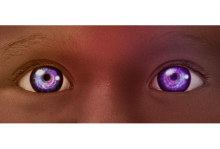
“Can a woman forget her sucking child ... ?” —Isaiah 49:15
Mary eyed her little survivor tightly
as he nursed and teethed, then crawl-step-jumping
taught Egyptian games to Nazareth boys
Joseph noticed his ears
how they filled like cups
how they thrilled at the sounds of the synagogue
sifting words that fell from dry scrolls
drifting
temple doctors muttered
shaking their heads
he speaks like a man
astonishing man!
mobs flocked to crossroads, pushing
their children forward, pleading:
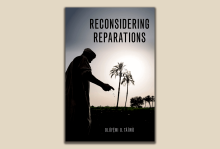
IN A FORMER job, I traveled to farms scattered around the world searching for coffee beans to make espresso drinks for Western consumption. I became intimately aware of the complex origins of something as seemingly simple as a cup of coffee and witnessed firsthand the currents of a worldwide distribution system that transfers surplus value from the Global South to the Global North.
In Reconsidering Reparations, Olúfémi Táíwò, an assistant professor of philosophy at Georgetown University, describes the history of this system and how it contextualizes discussion of reparations. Colonialism and trans-Atlantic slavery, what he terms the “global racial empire,” created the world and the complex web of social and economic relations we inhabit today. This system has resulted in an accumulation of safety, education, food, health care, and opportunity in Western countries and insecurity and precarity in the Global South. Táíwò argues this history is “not simply a point of comparison to the present. It is a way to map the currents that engulf us in the present.”
Unsurprisingly, these currents extend to the vulnerabilities occasioned by climate change. The metrics most equated with human flourishing—life expectancy, maternal mortality rates, dietary adequacy, literacy rates, sanitation accessibility, and “government effectiveness” (civil liberties, political rights, and governing accountability)—are significantly worsened by a country’s history of colonization and intensified by climate change. Climate justice and racial justice turn out to be the same project, in response to the same political history of global racial empire.
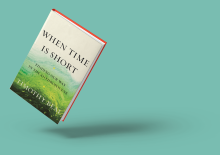
IN 2019, The New Yorker published an essay by Jonathan Franzen titled “What if We Stopped Pretending?” Franzen’s premise was simple—climate change is here, and no power or populace is making the sacrifices to stop it. His essay was met with an outcry that it is not too late, but since then that consensus has eroded. Bill Gates may still write books like How to Avoid a Climate Disaster, but the people who were doing that work while Gates was making his billions have come to darker conclusions.
Timothy Beal’s new book, When Time Is Short: Finding Our Way in the Anthropocene, is, as he states in the introduction, a “‘what if it’s already too late?’ book.” That we have a hard time accepting this possibility, Beal believes, is rooted in “our denial of the mortality of our species.” Those of us formed in an Enlightenment-capitalist frame simply can’t imagine the world without us. And that lack of imagination is one source of the very systems of exploitation and extraction that brought us to this point.
Beal, a religion professor and Hebrew Bible scholar, argues that our denial of death is in large part rooted in a particular (mis)reading of Genesis 1. There, humans are given dominion over creation and named as exceptional creatures in God’s own image. That exceptionalism, read through Enlightenment thinkers such as Francis Bacon and John Locke, became what Bacon called the “charter of foundation” of the colonialist project. Unprecedented exploitation and extraction followed. Indigenous cultures were uprooted from the land because Locke and others believed they had “forfeited by not fully subduing and maximally using its natural resources.”

NUMBNESS IS GOOD for dental work and as a temporary coping skill in surviving direct traumas. But most of us are not survivors of tornados or wildfires, haven’t lost our loved one to a young man with an assault rifle, nor worked triple ICU shifts at the peak of the pandemic. Yet many of us, myself included, hunker down deeper into whatever task is at hand when another breaking news bulletin about a mass shooting pops up on our phone. We barely glance at the latest tally of U.S. COVID-19 deaths or reports on war and natural disaster.
A few things recently have cracked open my numbness and made me wonder if we owe it to the dead and the grieving to let our hearts break.
I first saw the photo of a child-sized casket decorated with princess pink and a TikTok logo in a story shared on Instagram. Trey Ganem, a man who has a business creating custom caskets, had donated his work to the grieving families in Uvalde, Texas, where 19 children and two teachers were killed in their school by an 18-year-old with an assault rifle. Ganem sat with parents and asked about their children. Then he and his team made designs reflecting the delights and obsessions of typical childhoods: TikTok. Spider-Man. Softball. Whales for the girl who dreamed of becoming a marine biologist. The colors were bright and glossy; the caskets’ handles and trims were lovingly painted to match.
In the past I might have pondered the prevalence of commercialism in both American childhood and the funeral industry, or the cultural history of how we grieve. But this was only days after the Uvalde shooting, and the juxtaposition of cheerful designs on obscenely small caskets brought a rush of feeling: I wept at a stranger’s heartfelt attempt to bring solace to the inconsolable. I was deeply agitated that we are a country where slaughtered kids are sent to their graves in candy-colored caskets while politicians and weapons manufacturers rake in power and profit.

The Future Fight
Youth v Gov, currently streaming on Netflix, follows the 21 American young people suing the U.S. government for creating the climate crisis and failing to act to protect their constitutional right to life, liberty, personal safety, and property. Barrelmaker Productions

WHEN REVIEWING FILMS, especially from a faith-based angle, it’s natural to look for concrete messages. Most mainstream films tell three-act stories, and those typically include a tidy resolution that presents a perspective or moral. But film is also an art form, and great art is more interested in creating atmosphere and asking questions than providing answers—not unlike faith, which teaches us to pose unanswerable questions and to sit with uncertainty.
For those who like tidy narratives, filmmaker Alex Garland’s work can be frustrating. Garland’s films are concerned with big concepts, many related to the characters’ desire for control at the expense of their humanity and others’ lives. However, his films rarely answer the questions they pose, leaving room for viewer interpretation. For audiences willing to engage with art that lives in an in-between place, this can be a thrilling, sometimes visceral, experience.
Garland’s latest film, Men, is his most tonally upsetting and his most abstruse. In it, Harper (Jessie Buckley) rents a country manor as a space to emotionally recover from the violent death—a possible suicide—of her husband, James (Paapa Essiedu). Her idyllic solitude is disrupted by a series of men (all played by Rory Kinnear) who threaten her emotionally, psychologically, and physically. The men appear in various forms, including a patronizing older man, a vulgar child, a manipulative vicar, a macho policeman, and a naked, silent stalker.
The concept itself is clear; Men is about the act of male intrusion on the lives of women. But it’s the way the movie communicates the theme that creates questions Garland would rather ask than answer.
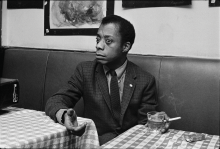
This article is excerpted with permission from You Mean It or You Don't: James Baldwin's Radical Challenge, 2022 Broadleaf Books.
IN 1958, Greek American film and theater director Elia Kazan asked James Baldwin to write a play. Specifically, Kazan recommended that he write a script based on the 1955 murder of Emmett Till in Money, Miss. The result was “Blues for Mister Charlie,” a play that proved to be one of the most intimate, gut-wrenching, and emotionally exhausting experiences of Baldwin’s artistic life.
As Baldwin worked on the script during the summer of 1963, he received the crushing news that his friend Medgar Evers had been killed. Evers was a civil rights activist and U.S. Army veteran who served as Mississippi state field secretary for the NAACP. Baldwin deeply admired Evers and later wrote, “When he died, something entered into me which I cannot describe, but it was then that I resolved that nothing under heaven would prevent me from getting this play done.” “Blues for Mister Charlie” opened at the Actors Studio in New York in April of the following year, 1964.
The play opens with the murder of Richard, a young Black boy in a small Southern town, which closely resembles Till’s murder. There is no suspense: Lyle Britten, the white owner of the local general store, has shot Richard and dumped his body outside of town. The grieving family includes Rev. Meridian Henry, Richard’s father and the nonviolent leader of the local Black church; Meridian’s mother (and Richard’s grandmother), Mother Henry; and Juanita, a young Black student who loved Richard. Parnell James, the white liberal editor of a local newspaper, tries to appease all parties, unsuccessfully.

IN THE OPENING scene of Cecil B. DeMille’s 1927 silent film The King of Kings, a scantily clad but opulently accessorized Mary Magdalene reclines on a lush chaise lounge, caressing a cheetah. She’s an upper-class prostitute, and she learns that Judas, one of her clients, has left her to follow a carpenter. Furious, Mary demands, “Harness my zebras—gift of the Nubian King! This Carpenter shall learn that he cannot hold a man from Mary Magdalene!”
Before she mounts her chariot, someone wagers a purse of gold that she won’t be able to take Judas back from Jesus, because Jesus has magical power to heal the blind. Mary scoffs in reply, “I take thy wager—I have blinded more men than He hath ever healed!”
An angry, haughty Mary finds Jesus, but when he looks at her, she is shaken and steps back. Jesus begins to heal her of seven demons, which emerge one by one from her body like ghosts. After the demons have departed, Mary looks down at her partially naked body, picks up her cloak to cover her skin and hair, then kneels at Jesus’ feet. He pats her head, as if patting a child, and looks away, speaking not to her, but to a man beside him.
I had enjoyed Mary Magdalene’s exotic transportation via zebras, her fury at being scorned, her verbal sparring with the men who doubt her ability to win Judas back. But as I watched the “demons” drain out of her, I felt her life draining too. Now docile and meek, she responds to healing by clothing herself more modestly. The viewer, I take it, is supposed to feel amazed at her transformation. Instead, I felt horror, like I was watching Christianity’s centuries-long suppression of women captured in a 20-second clip, with Mary Magdalene standing in for all of us. The film was silent, but I could hear it speaking to women loud and clear: “Cover up. Lower your eyes. Kneel. Repent. Leave your body and your sexuality behind. Submit. That’s a good girl. You are allowed to belong now.”
Centuries of obsession
WHILE CHEETAHS AND zebras and Judas as Mary’s patron were new adornments to the Mary Magdalene story, the rest of the film’s portrayal was consistent with how Mary has been painted in popular culture for the last 1,500 years: Mary, the prostitute and sinner, turned repentant.
In the earliest accounts, Mary Magdalene is never called a prostitute. Luke 8 says she was healed of demons, but nothing is mentioned about her line of work. It is not until 591 C.E. that Pope Gregory I preaches a sermon calling Mary Magdalene a prostitute, and the misidentification has stuck.
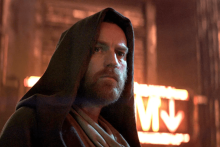
At its heart, Obi-Wan Kenobi is the story of a monastic rediscovering his vocation, and it provides us an excellent model for how laypeople and monastics alike can work toward justice and mercy.

Ten stories that show how Roe's overturn will impact economically poor, politically marginalized, and socially vulnerable people — and what Christians can do.

The filmmakers tell the stories of LGBTQ Catholics and their families with gentleness and respect. “Nothing converts like stories,” Martin says in the film.

In his new book, We Need to Build, Patel seeks to inspire others to build with him instead of just criticizing policies and structures they dislike. The book draws on Patel’s work with Interfaith America and considers what we can learn from good (and bad) institutions across the globe.
